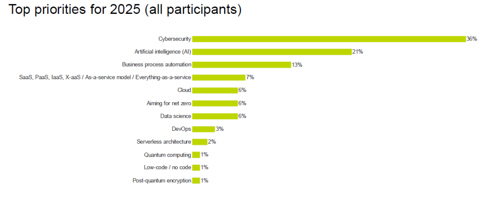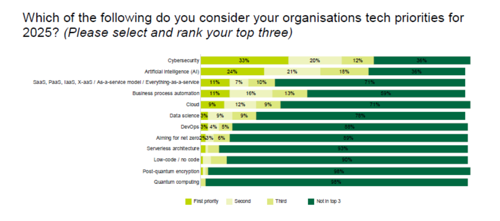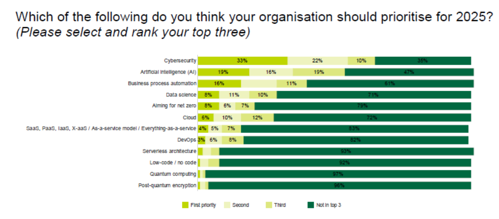Priorities
The following chart shows a combined view, both IT leaders and IT professionals, of top priorities.
Comparative priorities and additional concerns
IT leaders' view of tech priorities:
It is a reflection of the breadth of BCS influence and membership that additional concerns cited by leaders were so varied, although there were trends here. These included agile transition and automated data governance. Societally-focused ideas also came up, including to ‘assist with local digital-divide support’, green IT, IT literacy for all and dealing with misinformation.
A number of specific tech issues were cited such as clinical apps, developing a data platform, robotic automation, developing self-serve analytics, software end-of-life transition, addressing technical debt, and exploring ‘new semiconductor technologies that can aid neuromorphic computing and low-power AI hardware.’
Interestingly, several were blockchain related: one leader’s focus is decentralised exchange (DEX) — a peer-to-peer platform for trading cryptocurrencies without a central authority, and another mentioned exploitation of distributed ledger technology in banking.
IT professionals’ view of what tech priorities should be:
Our main question here asked what IT professionals thought their organisations should focus on. We also asked them to tell us other things their organisations are focusing on for the coming year.
One member made an interesting start to this: ‘Competence, data quality governance, and cyber security — every other item is dependent on these three.’
Also cited were accessibility, service availability, connectivity everywhere, containerisation (Docker, Kubernetes, Podman) and data strategy. Cloud repatriation — the process of moving data, applications, and services from a public cloud to an on-premises data centre, private cloud, or a hybrid model — came up several times.
The societal and ethical considerations listed included: device life extension, digital accessibility, digital rights & privacy, diversity across distributed talent, and bridging the digital skills gap.
One final interesting one: working on ‘PIDs : permanent identifiers.’ These unique identifiers can locate and distinguish between information about people, objects or concepts online. These are a key part of open research and are machine-operable, meaning they can be easily parsed by computers.











